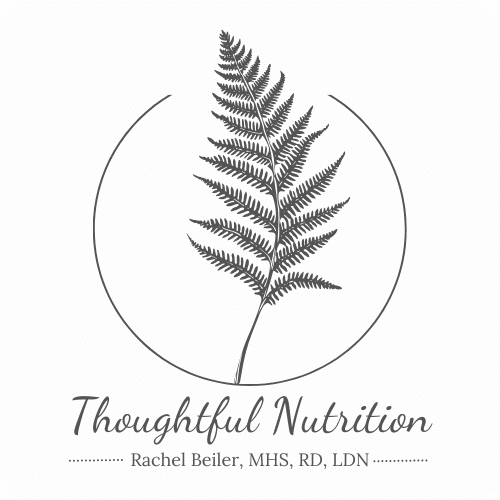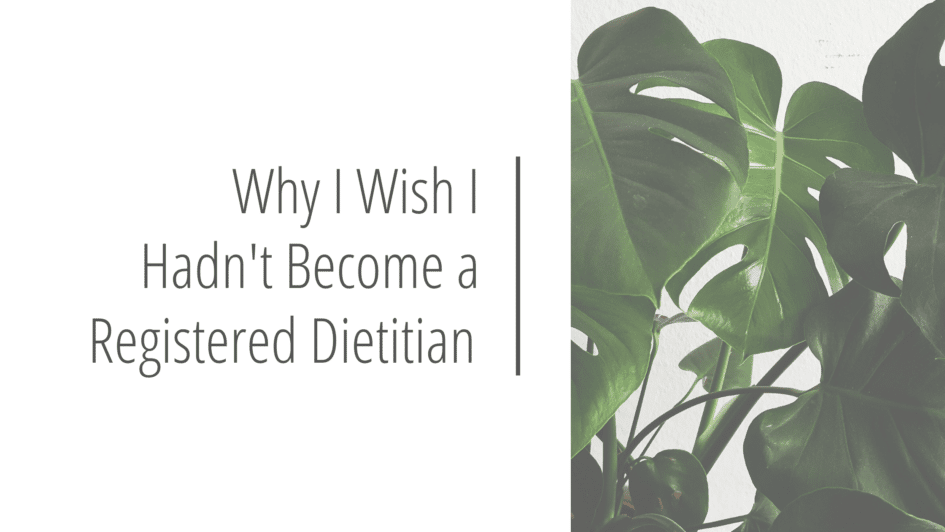This blog isn’t about why I’ve lost my passion as a dietitian or how I don’t care about nutrition anymore, because those two statements aren’t true. I enjoy being a dietitian, but it’s not all sunshine and rainbows. There are several reasons why I wish I hadn’t become a dietitian, but the positives still outweigh the negatives.
Table of Contents
The Food Police
Sometimes dietitians are known as “the food police.” People can be weary for dietitians to know or see what they are having for a meal or snack. People tend to worry that dietitians are silently judging how “healthy” or “non-healthy” their meal is or how “bad” or “good” their snack is. While some dietitians are like that, I’m certainly not. However, that’s not actually the reason I included “food police” in this blog.
People tend to think that dietitians are the food police, however, I actually think that people police dietitians’ food more than dietitians police their food. Dietitians are held to a certain standard when it comes to the foods they eat. It’s expected that we always get our fruit and vegetables in or that we never eat cake or that we don’t use butter, etc. When I go to gatherings that involve food or have a meal with friends/family where people know I’m a dietitian, I don’t ever judge (or even really look at) the food on other people’s plates. However, I can always feel eyes and judgment all over the food that’s on my plate. I’ve even heard, “But you’re a dietitian, I thought you wouldn’t eat that” or “I didn’t think a dietitian would eat dessert.”
Dietitians like to enjoy their food too. Please keep your eyes and judgmental thoughts away from our plates.
Diet Talk – All Day, Everyday
When I meet someone for the first time, I often dread them asking what I do for a living. As soon as I mention I’m a dietitian, the diet talk begins. This also happens with friends and family that I see on a regular basis. People feel the need to tell me about their gluten free diet (even when they don’t have Celiac *insert eye roll*), how they’ve lost weight being on keto, how Whole30 changed their life, how Paleo is the best diet they’ve ever been on, how they need to lose a couple pounds, how they bought a fancy new scale, how they’re cutting out sugar… Whatever the topic is, the diet talk never ends.
The diet talk is actually extremely ironic since I’m an anti-diet dietitian and most of my friends/family know that. Yet, the diet talk continues. However, strangers don’t know that I’m anti-diet, so I guess I can’t really blame for them talking about dieting to a dietitian since ya know… diet culture exists. BUT, that doesn’t make it any better for me or any less triggering.
Weight Stigma
If I could pick one thing that I hate the most about being a dietitian, my choice would be weight stigma. When people picture a dietitian in their minds, they picture someone skinny. People think that in order to be a dietitian, that person must be skinny and if they aren’t skinny, then they must have become a dietitian to learn how to be skinny and lose weight. I’m tired of people thinking that dietitians can’t be fat. I’m tired of people thinking that fat dietitians are bad dietitians.
If you’re reading this and thinking, “Well, dietitians should be skinny. Fat dietitians are bad dietitians.” I ask you to leave my blog, because there’s nothing on my website that you will benefit from.
Diet Advice
Because I’m a dietitian, I want to give out free diet advice, to everyone, all the time… right?! Definitely not. Again, I’m an anti-diet dietitian so I don’t ever really give out “diet” advice. However, if you want to talk about Intuitive Eating, HAES, body positivity, diet culture, or anything related to that, I’m all ears!
I constantly get asked about diet advice. Here are some examples:
- What are your thoughts on _____ diet? I’m thinking about starting it.
- What are your thoughts on gluten free bread versus non-gluten free bread? Which one is healthier?
- How much protein do I need? or do you think I am getting enough protein?
- What are your thoughts on ______ supplement?
- Should I be excluding dairy, gluten, and/or carbs?
- Should I eat full fat or non fat dairy products?
- Are eggs good or bad for you?
- Aren’t sweet potatoes healthier than white potatoes?
- Will bread give someone diabetes?
I could go on and on. The most frustrating part of the whole thing is that, when I do give a thoughtful answer, it’s typically not the answer they were looking for. For example, if I say that gluten-free bread isn’t healthier than regular bread, the person has already made it up in their mind that gluten-free bread is healthier. It doesn’t actually matter what I say, they’re going to continue to think that gluten-free bread is healthier. It only matters when I agree with their answer to the question they asked me. If someone asks me about a protein supplement or pre-workout supplement and I say that I don’t they’re necessary or that the contents of the supplement aren’t regulated by the FDA, my answer doesn’t matter to them. They are going to keep using that protein supplement or that pre-workout because they wanted a specific answer from me, they didn’t want to know what I actually think. They simply want me to agree with the conclusion they already have in their head.
Obviously, this can be extremely frustrating. On one side, I don’t even want to give out diet advice because that’s just not the type of dietitian that I am. On the other side, when I do answer the question, it doesn’t really matter what I say, because the asker is only going to listen to what I say if it coincides with what they already think.
Misconceptions about Nutrition
Handling nutrition misconceptions can be exhausting. Everyone has their own interpretation of what nutrition is and what it should look like. However, I went to school for 6 years to become a dietitian so I actually know what nutrition is and what it should look like. Here are some common misconceptions that I hear/see on a regular basis:
- Someone won’t eat bread because it has carbs and carbs are “bad,” but they still drink sugar-filled Starbucks drinks, soda, and energy drinks.
- People who think cheese has carbs.
- People who eat WAY more protein than recommended because for some reason they think protein is the healthiest macronutrient.
- People who don’t even know what macronutrients and micronutrients are but give out diet advice.
- Keto worshippers (or any low-carb advocate) that eat nothing but meats and cheese instead of carbs but don’t realize that meat/cheese are both high in fat (Mostly saturated fat FYI), which has 9 kcal/g while carbs only have 4 kcal/g… so they’re actually increasing their calorie intake and dramatically increasing their risk of heart disease.
- People who think foods with artificial sweeteners are healthier (such as sugar alcohols, diet sodas, sugar-free syrups, etc) but research shows that artificial sweeteners actually increase your cravings for sweet foods. This is why many people who constantly eat/drink products with artificial sweeteners are “sweet addicts” that strongly crave desserts and other sweets.
- People that think diet foods (such as low calorie, fat-free, gluten-free, etc.) are healthier when in reality they are often very high in sodium and trans fat, which are both strongly linked to several chronic diseases.
I could go on and on. Nutrition misconceptions are everywhere.
One word: Influencers
Words cannot express how frustrated and annoyed I am by health influencers and health coaches. They are all over social media and they make money off of people who are helpless and desperate for health advice, quick fixes, and weight loss.
I’m here to say that most influencers don’t have a degree in anything related to health, overall wellness, or even fitness. Health coaches typically only have 6 months to a year of nutrition education.
Now, let me tell you what dietitians have to go through in order to become a registered dietitian (RD). In order to become a dietitian, you have to apply for and be accepted into an undergraduate nutrition program that is accredited by ACEND (Accreditation Council for Education in Nutrition and Dietetics). Not all 4-year colleges offer an accredited program. Also, before you can even apply to a nutrition program, you have to take 2 years of pre-requisite classes and make high enough grades to be accepted. Once you’re in that program, you have to maintain good grades in order to graduate from the accredited program. Once you have successfully completed your 4-year degree, you then have to apply (written application and in-person panel interview) to an ACEND accredited dietetic internship program, which only has a 50% acceptance rate. Once you’ve been accepted into the program, you have to complete 1200 supervised practice hours with dietitians in the areas of clinical nutrition, food service, and community nutrition. The 1200 hours are almost always unpaid and equate to 30 weeks of full-time work. You’re basically a free workhorse for dietitians. In addition to the 1200 supervised hours (that you pay graduate school tuition for), you also have to complete graduate-level assignments at the same time. Once you’re done with the dietetic internship program, you then have to study for the RD exam, which only has a 70% pass rate and costs $200 every time you take it. Once you’ve passed your exam, you either enter the workforce or can choose to finish your graduate degree (or both). I chose to finish my degree, which means I have now have my MHS. However, in 2024, all individuals wishing to become dietitians will have to finish a graduate program (in addition to the internship) before they can even sit for the RD exam. In addition to college education, RDs have to complete 75 hours of continuing education every 5 years (which is not free) in order to keep registration status. RDs also have to pay yearly licensure fees.
I say all of this to make the point that people take nutrition advice from influencers and health coaches before they take advice from a dietitian who had to go through all of the above in order to become and stay a registered dietitian. It is extremely frustrating.
Not all dietitians love to cook
Last but not least… Just because I am a dietitian, doesn’t mean I love to cook. Personally, I don’t get much enjoyment out of grocery shopping, meal prepping, recipe testing, and cooking meals. For some reason, people assume that because I’m a dietitian, I love to cook and that I am a great cook. Although I do like to eat at home for 75-80% of my meals, that doesn’t mean I cook elaborate meals from scratch every single time I eat. Dietitians don’t have to love cooking to be good dietitians.
Conclusion
If you made it this far, thanks for taking the time to read my thoughts! ?
Sincerely,
Rachel Beiler, MHS, RD, LDN
You have to nourish to flourish!


Leave a Reply